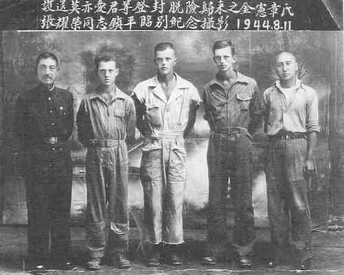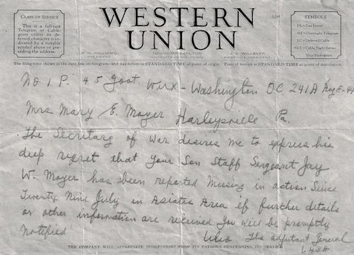
“Pop” is on the far left. My grandfather is standing beside him.
During World War II, my grandfather, Wesley Moyer, was declared “missing in action” after his plane was shot down over China. I found this manuscript that he wrote about his experience:
A Tribute to Pop
JULY 29, 1944:
“A DAY TO REMEMBER, A DAY I SHALL NEVER FORGET”
WORLD WAR II-CBI THEATRE (20TH AIR FORCE)
MISSION: ANSHAM MANCHURIA
After four hours of flying, we were forced to leave formation, due to engine trouble. We could not make the secondary target, but the last resort, a Japanese airfield, was within reach. On the first run, our bombardier could not get the target in his sights. On the second run, he failed to do so again.
By then, the Japanese were on to us. We were hit by anti-aircraft and Japanese planes. We were flying at 18,000 feet, but with only one engine operating, we were rapidly losing altitude and we were forced to bail out at 2500 feet, thirty miles from the enemy airfield in occupied China.
I landed on top of a barren mountain, hid my parachute and waited. Within one hour, I met Ben, our tail gunner. Since we were on the top of a mountain, we saw a small village in the valley. On our way down, we met Petersen, our bombardier, and we went to the village.
One of the men immediately hid us in a cave. About five hours later, our co-pilot and flight engineer came to join us. Now there were five of us. For three nights, they took us up a mountain, and then before dawn, they took us back to the cave. We found out later they did not know what to do with us. The United States government offered $500 per man, and the Japanese offered the same. It was easier for them to go 30 miles than to take us 300 miles to safety.
On the fourth night, they took us to another village, as we only traveled by night so we could not be seen by the enemy. This was a large village and we dodged behind a number of houses until we finally went into one.
It was then that I first saw him. He was sitting on the ground floor, a distinguished looking man, dressed in white denims. A lady was there and she spoke perfect English, and she told us he was to be our leader, and we would travel at night and sleep during the day. He kept looking at me and smiled all the time.
After the lady told us what was ahead, crossing enemy lines, etc., she asked if we had any questions. After she answered a few, I asked why he was looking at me all the time. She then spoke to him in Chinese, and he answered her. She smiled and said he never saw a person with red hair before.
Whenever we stopped to rest in the nights that followed, he always wanted to sit by me. Since my last name is Moyer, he called me Moyea, and because he was older, I called him “Pop,” and that is how it was for the next three weeks. We had no change of clothes, as we slept with them on, always ready to move if we were seen by the enemy. We didn’t smell that good and got very sticky and I used to have him scratch my back.
On the eighth night, we stopped to rest and met two more of our crew, Joe and Ted. Now there were seven of us. There were eleven on our crew. They told us that three were killed, and we wondered which of the four were still alive. The next two weeks were about the same: sleep by day, walk nights. Sometimes we slept under the stars, sometimes in a house. The family moved out and we moved in and we always slept on the floor. One day we slept in an old fort, with three walls still standing.
One afternoon, they woke us up at 1:00PM and were very excited. They told us we had to move quickly and they took us off the beaten path, as there were no roads in the mountains. About two hours later, four of the Chinese men came back grinning, holding up one hand, then went through the motions of slashing their neck and said, “Five Japanese.” The Japanese were on our trail with a patrol of five men. The Chinese slew the Japanese without firing a shot.
Pop was a heavy smoker. He smoked three cigarettes, one right after the other. He would go for about one hour and then smoke three more. One night as we were crossing the lines, they ran out of cigarettes, and we stopped to rest. Two of the Chinese men left us, waited until one of the Japanese got near the tree they were in, jumped on him, and killed him. Soon they came back, each with an armful of cigarettes. How they got them, I will never know.
On the 23rd day, we were in friendly territory and we walked during the day. We saw a nice size town or small city ahead of us. Pop then ordered all of us to stop. He started to undress, and one of the Chinese men came with a uniform and Pop put it on. Through our interpreter, we came to find out he was a General in Chiang Kai Shek’s army. Imagine a Sergeant having a General scratch his back.
As we entered the city, people were lined up along the street. We were in a parade and they considered us heroes, but we sure didn’t feel like heroes. We stayed there for two days, saw a native play and had a thirteen-course banquet. It was here that we were met by an American Sergeant who told us to get onto the back of his truck.
As we were driving away from our friends, we waved our good-byes and saluted Pop. He then saluted back and I could see tears in his eyes.
We then went to a small outpost consisting of five men. Chills ran up my back when I saw the American flag. It was here that we met Lieutenant Scandrett, who was taken out of enemy territory by another group. He followed the same trails we took, only he was two days behind.
We were there four days when a C47 escorted by two fighter planes arrived. We boarded the plane, engines still running, and they took us back to our base in India.
During our travels with Pop, we were given straw hats, so at night we looked like the Chinese. I have that hat hanging in my bedroom, and each night as I go to sleep, and each morning as I wake up, I thank God for sending Pop to take us back to safety.
Yes, Pop, I think of you often, and I pray that somehow, wherever you are, you will know your red-haired friend is thinking of you.
-Written by Wesley Moyer

My great-grandmother received this telegram on August 4, 1944.
Wesley Moyer met my grandmother, Eileen (Enright) Moyer, and they had seven children, thirteen grandchildren, and as of this writing, seven great-grandchildren. He passed away on February 26, 2003, after a fourteen-year battle with Parkinson’s Disease.
I often think of my grandfather’s “missing in action” story. While the Chinese General saved the lives of these soldiers, he also saved the lives of their children, grandchildren, great-grandchildren and many generations to come. Somewhere out there are the grandchildren of the Chinese General, and wherever they are, I would like to thank them for what their grandfather did for mine.
My grandfather had a unique influence on my work. He was also a filmmaker, but in a different way. He filmed hundreds of hours worth of 8mm movie footage of our family and the community. After he passed, I converted most of the home movie footage to video and distributed it to family members. I also converted the footage he shot of his hometown of Harleysville, PA, and posted it on a dedicated youtube page.
There are references to my grandfather’s war experience in my first film The Good Life, and I hope to someday turn his “missing in action” story into a movie script.
Here is a clip from a documentary where my grandfather talks about his experience: